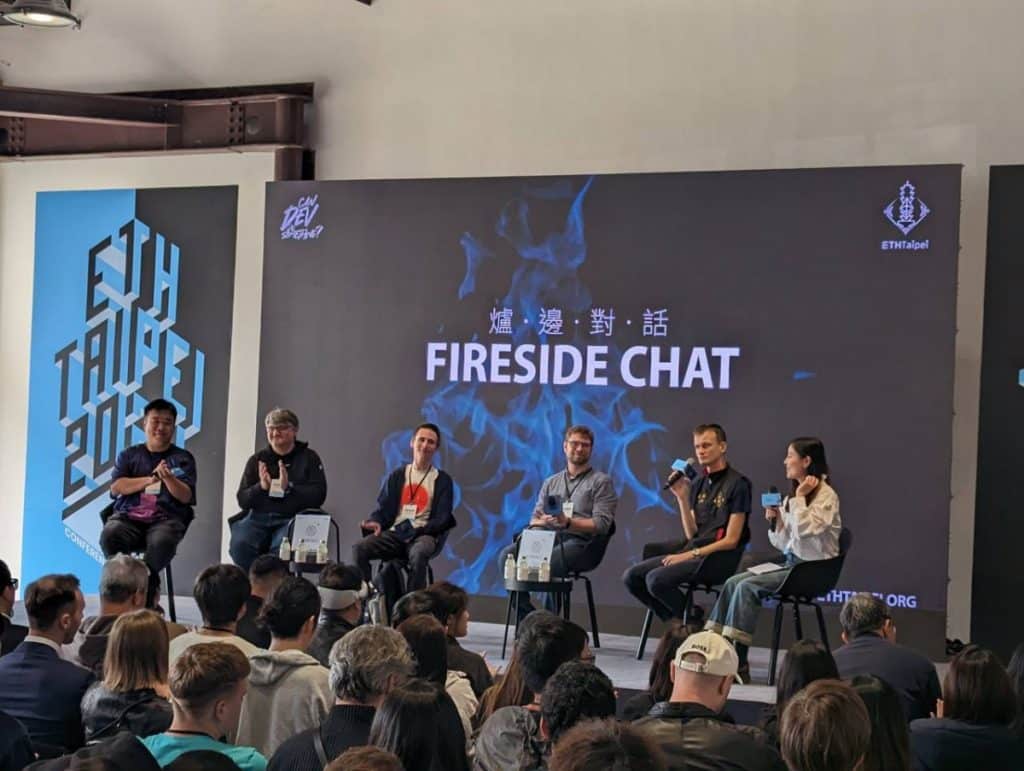Metis CTO Yuan Su Joins Ethereum Co-founder Vitalik Buterin at ETHTaipei to Discuss Scaling & Crypto Future

In Brief
ETH Taipei 2024 is the annual conference of Ethereum developers and a hackathon that is being held this week between March 21 and 24. It is a four-day event that invites developers from all over the world to explore all that is going on in the world of Ethereum through active workshops, insightful talks, and a competitive hackathon

At the ETH Taipei conference, which gathers industry experts and innovators, Metis’s Chief Technology Officer, Yuan Su, shared the stage with Ethereum co-founder Vitalik Buterin. During a Thursday session, Su emphasized the importance of the open source culture of the crypto space and its adoption, which is far more important for the industry than scaling.
ETH Taipei 2024 is the annual conference of Ethereum developers and a hackathon that is being held this week between March 21 and 24. It is a four-day event that invites developers from all over the world to explore all that is going on in the world of Ethereum through active workshops, insightful talks, and a competitive hackathon.
This way, the event unites Ethereum-focused teams, presenting a particularly unparalleled opportunity to hear renowned experts, scholars, and industry leaders discuss cutting-edge technology and the latest trends and applications of Ethereum.
In addition to Buterin and Su, the event also featured David Wong of ZKSecurity, Jordi Baylina of Polygon, Martin Derka of Zircuit, Karl Floersch of OP Labs, Philipp Seifert at Gnosis, and Seraya Takahashi of Web3 Foundation as speakers.
Scaling or Adoption?
During the event, Buterin applauded Ethereum developers for implementing the much-anticipated Dencun update “flawlessly” last week. This major upgrade introduced a new data storage solution called blobs through proto-danksharding. As a result, L2 data can be stored on-chain for a temporary period, about a month instead of forever, hence significantly reducing L2 gas fees to near-zero.
At the event, Buterin shared that Ethereum core developers had hoped that L2 networks would use three blobs on average per block, yet current levels are about 67% lower than that target. This shortfall comes despite Ethereum stakeholders’ prediction of a significant spike in L2 traffic due to the reduction in L2 fees, partly due to a surge in the network gas fees to exorbitant levels, rendering the network unusable for many retail users.
Commenting on this major milestone, Metis’ Su said it was the most exciting thing, and that is “definitely good news for all L2s out there”. However, instead of posting data on Ethereum, the Metis network chose a different data availability (DA) layer, and as Su stated, it was for a good reason.
According to him, “scaling, of course, is very important, but for this industry to grow, adoption is even more important.” As such, Metis has “tried a different layer of DA,” that reduced the transaction cost to a very low level, and is trying to “incentivize different applications to try new things on L2 with different degrees of successess.”
“We keep trying because we think adoption is even more important,” said Su.
It’s All Community Effort
While Ethereum has undergone a major upgrade to advance its network, Metis also made history recently. Talking about this development, Su stated that they “deployed an infrastructure foundation for decentralized Sequencer, so we are super excited about it and look forward to the next upgrade.”
Unlike current L2 network operators, Metis is no longer dependent on a centralized Sequencer. Rather, it is fully decentralized. It has achieved this by introducing a pool of Decentralized Sequencers, addressing the biggest risk in the Ethereum rollup space. With this change, Metis aims to offer higher uptimes, better censorship resistance, lower fees, and increased security. Meanwhile, Sequencer nodes are rewarded with the opportunity to earn METIS tokens for producing blocks and processing transactions.
Launched in May 2021, Metis is a permissionless L2 network designed to power the next generation of dApps. The network uses optimistic rollup technology and aims to enhance speed, scalability, and storage efficiency.
The network puts a special focus on being freely available, constantly under development open-source software that anyone can contribute to. Talking about this important aspect of blockchains, Su noted at the ETH Taipei event that we all benefit from this open source culture of our industry by “collaborating indirectly or directly through the source codes.”
Metis CTO also took a dig at projects that decided to go close in an industry whose ethos involves being accessible to all. Without taking any names, Su stated, “If you are in the space (where) we are building a trustless system,” how are you going to achieve that, “if it’s not open.”
“It’s really a community effort; it’s an industry-wide effort to push this technology going forward, so definitely call to make sure that hey, let’s open source,” said Su.
Disclaimer
In line with the Trust Project guidelines, please note that the information provided on this page is not intended to be and should not be interpreted as legal, tax, investment, financial, or any other form of advice. It is important to only invest what you can afford to lose and to seek independent financial advice if you have any doubts. For further information, we suggest referring to the terms and conditions as well as the help and support pages provided by the issuer or advertiser. MetaversePost is committed to accurate, unbiased reporting, but market conditions are subject to change without notice.About The Author
Gregory, a digital nomad hailing from Poland, is not only a financial analyst but also a valuable contributor to various online magazines. With a wealth of experience in the financial industry, his insights and expertise have earned him recognition in numerous publications. Utilising his spare time effectively, Gregory is currently dedicated to writing a book about cryptocurrency and blockchain.
More articles

Gregory, a digital nomad hailing from Poland, is not only a financial analyst but also a valuable contributor to various online magazines. With a wealth of experience in the financial industry, his insights and expertise have earned him recognition in numerous publications. Utilising his spare time effectively, Gregory is currently dedicated to writing a book about cryptocurrency and blockchain.






















































